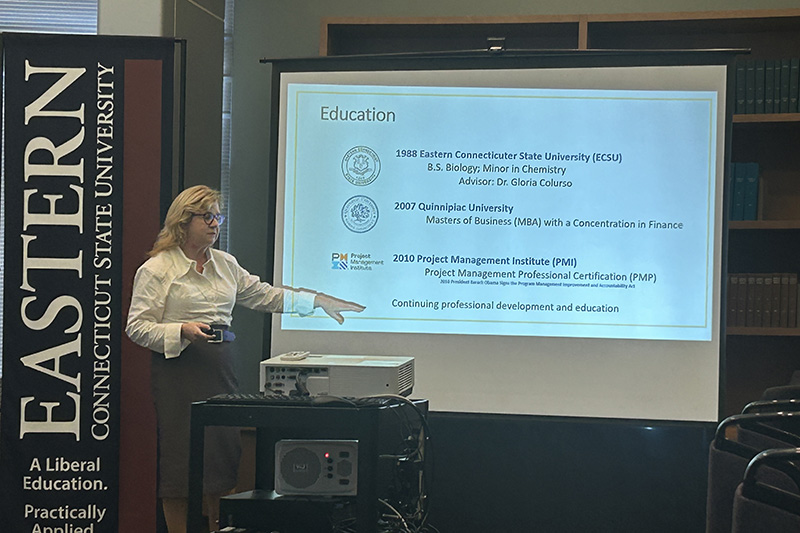- Apply
- Visit
- Request Info
- Give



Published on November 07, 2023

The Biology Department at Eastern Connecticut State University featured alumna Shirley Lasch '88 at a seminar. Lasch is an executive at QurAlis in Cambridge, MA, and she shared the testimonies of her academic and medical careers at the Oct. 27 seminar titled “A Career Path in Drug Discovery and Development.”
While studying at Eastern, Lasch got a taste of the medical field by working at Windham Hospital. After graduating with a B.S. in biology and a minor in chemistry, she devoted her career to working on drugs for various diseases, particularly those that are neurodegenerative. She has interacted with the hands-on clinical procedures of drug discovery as well as the business side of drug distribution.
Lasch’s first professional job was working at Bristol-Meyers Squibb for a decade in Princeton, NJ. The niche was specific to cancer antibodies, which, Lasch reported, were “not considered therapeutic standard for care of humans.”
Lasch moved on to work in biotech at the Institute for Neurodegenerative Disorders in New Haven, while simultaneously completing her M.B.A. in professional development with a concentration in finance. This would mark the turning point in her career, as she would expand her work into the business side of drug distribution. She said, “Continuing education is such a huge advantage to my career.”
Lasch also emphasized the importance of managing work life and professional status while still remaining true to one’s personal obligations. As the mother of two, location and security were vital, so she landed the job in New Haven after “a lot of convincing” of her future employers.
“I went from a well-paid job to an administrative position in project management and clinical operations because I wanted to stay in Connecticut,” said Lasch, "despite the fact that I wasn’t making what I was previously, I felt what I was doing was right.”
Later, Lasch would go on to become a senior clinical project manager in an advanced clinical lab with the Flatley Discovery Lab in Boston. She elucidated the difference between working on a project and managing people, saying that as a project manager, one is “not really a scientist," rather "you’re coordinating projects from start to finish.”
“Because I was willing to take a risk, I have the opportunity to do important work on Parkinson’s disease,” she said. “I work on products for diseases that are under-catered to, that is, they have a high unmet medical need.”
Lasch gave insight into the process of drug discovery and distribution. Here, she would hone both her medical and management knowledge, as the process of getting a drug made and mass produced is a merging of marketing and the scientific method. “Each stage requires different levels of expertise,” explained Lasch. “The flow relies very heavily on project management.”
She talked about the importance of administration in the medical field and how heavily dependent it is on patents. Timing is key, so that the scientists can test and approve the medicine in time because the cost for each stage of testing is exorbitant. “Your patent is only good for a certain amount of time. Drugs take billions of dollars to bring to the market,” she said.
Written by Elisabeth Craig